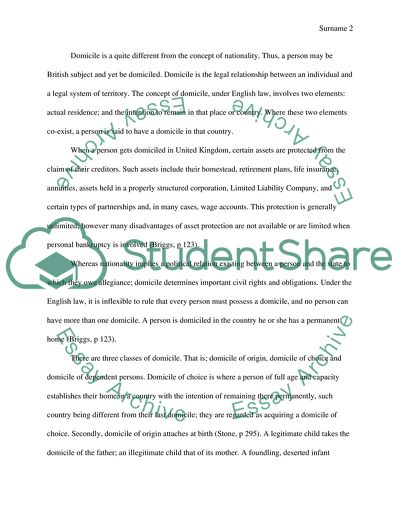Cite this document
(The Conflict of Laws Term Paper Example | Topics and Well Written Essays - 1500 words, n.d.)
The Conflict of Laws Term Paper Example | Topics and Well Written Essays - 1500 words. https://studentshare.org/law/1748293-domicile-in-its-present-form-is-a-concept-whose-time-is-past-in-the-19th-century-when-english-courts-were-trying-to-decide-between-nationality-and-domicile-the-concept-of-domicile-which-then-obtained-was-much-more-like-the-concept-of-habitual-residen
The Conflict of Laws Term Paper Example | Topics and Well Written Essays - 1500 words. https://studentshare.org/law/1748293-domicile-in-its-present-form-is-a-concept-whose-time-is-past-in-the-19th-century-when-english-courts-were-trying-to-decide-between-nationality-and-domicile-the-concept-of-domicile-which-then-obtained-was-much-more-like-the-concept-of-habitual-residen
(The Conflict of Laws Term Paper Example | Topics and Well Written Essays - 1500 Words)
The Conflict of Laws Term Paper Example | Topics and Well Written Essays - 1500 Words. https://studentshare.org/law/1748293-domicile-in-its-present-form-is-a-concept-whose-time-is-past-in-the-19th-century-when-english-courts-were-trying-to-decide-between-nationality-and-domicile-the-concept-of-domicile-which-then-obtained-was-much-more-like-the-concept-of-habitual-residen.
The Conflict of Laws Term Paper Example | Topics and Well Written Essays - 1500 Words. https://studentshare.org/law/1748293-domicile-in-its-present-form-is-a-concept-whose-time-is-past-in-the-19th-century-when-english-courts-were-trying-to-decide-between-nationality-and-domicile-the-concept-of-domicile-which-then-obtained-was-much-more-like-the-concept-of-habitual-residen.
“The Conflict of Laws Term Paper Example | Topics and Well Written Essays - 1500 Words”. https://studentshare.org/law/1748293-domicile-in-its-present-form-is-a-concept-whose-time-is-past-in-the-19th-century-when-english-courts-were-trying-to-decide-between-nationality-and-domicile-the-concept-of-domicile-which-then-obtained-was-much-more-like-the-concept-of-habitual-residen.


